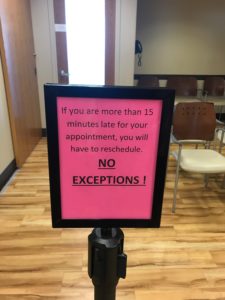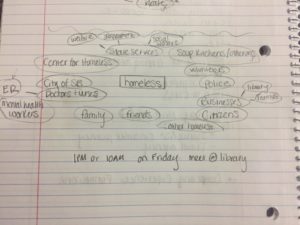Ethnography Summary- Uber Immersion
Joe Krause and Alex Charron took an Uber to and from the Saint Joseph Regional Medical center in order to estimate ride costs and duration, as well as talk to the drivers to gain their perspective on current transportation problems. The team spoke with 2 different drivers who asked to remain anonymous. The team combined the information from both drivers into 1 summary because both drivers had similar responses to our questions.
Date: 3/3/17
Type: Immersion
Location: From Notre Dame to Saint Joseph Regional Medical Center and back
Team participants: Joe Krause and Alex Charron
User Characteristics: “Uber Driver”
- Drives clients to a specific location using an App-driven service
- Deals with people who have the App regardless of their demographics or background
Memorable Quotes:
- “Older people who cannot drive are starting to use Uber more, which I think is great because they are less dependent on public transportation or family and friends.”
- “It does not always make sense for me to drive during the day since I get way more money when I drive at night.”
- “I usually just drive whenever I have free time and I think that is the case for most drivers.”
Top 3 Learnings:
- Older people who cannot drive are beginning to use Uber as a main form of transportation to get anywhere ranging from doctors appointments to grocery stores.
- Before 8pm, most people use Uber to get somewhere that they need to go such as the dry cleaner or grocery store. After 8pm, most people use Uber to go to dinner or a bar.
- Surge charges drastically increase the price of an Uber.
Key insights:
- There are a lot more Uber drivers working at night because they make a lot more money working at night compared to working during the day. This is simply because more people use Uber at night.
- Elderly people are sometimes skeptical of using Uber, but after a few times they usually become comfortable with the service and then they will tell their friends and family about it.
- People that use Uber during the day usually do not have a car or access to a car.
- It is very common during the day for drivers to take customers to a medical appointment or urgent care.
Our Data:
- The trip from campus to the medical center took 11 minutes and it costed $13.51.
- The trip from the medical center to campus took 12 minutes and it costed $7.28.
- The difference in price was due to a surge charge from Uber.
- Surge charges can be so high at times that it does not make sense financially to use Uber instead of another option such as a cab.
Other Findings:
- The first car we were in was a mid-size svu and it was very comfortable/ spacious.
- The driver has picked up people in wheelchairs and people with oxygen tanks, although it is very rare for this to occur.
- The second car was a small sedan and it was not spacious. The driver had both front seats far back, which gave us very little leg room.
- The driver has never picked up anyone with a wheelchair or oxygen tank. He was unsure if he would be able to since his car is so small.
***Attached below are photos from our Uber Immersion.

